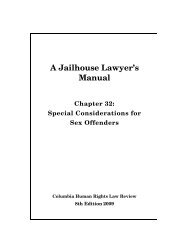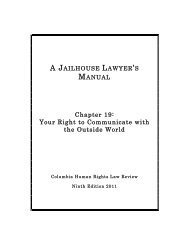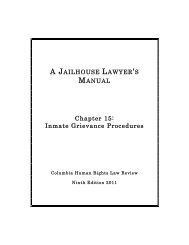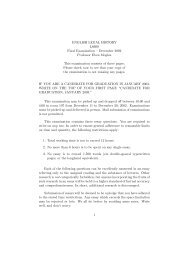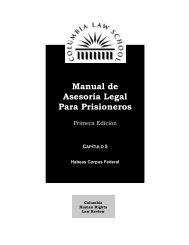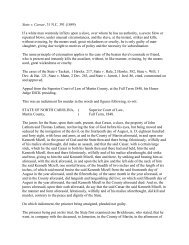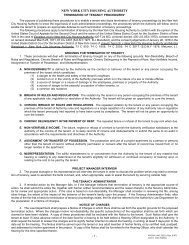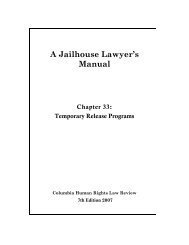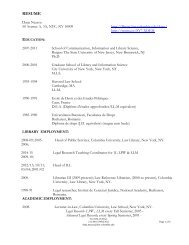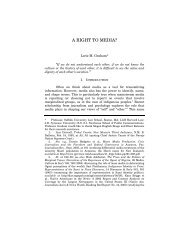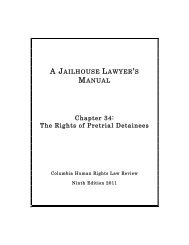The Right to Dignity Rex D. Glensy - Columbia Law School
The Right to Dignity Rex D. Glensy - Columbia Law School
The Right to Dignity Rex D. Glensy - Columbia Law School
You also want an ePaper? Increase the reach of your titles
YUMPU automatically turns print PDFs into web optimized ePapers that Google loves.
134 COLUMBIA HUMAN RIGHTS LAW REVIEW [43:65<br />
interests, rights, and values because of the inevitable confusion that<br />
would result. 315<br />
<strong>The</strong>se criticisms suffer slightly because of the artificial edifice<br />
they are attempting <strong>to</strong> construct. Even though it would be<br />
comfortable <strong>to</strong> think about each legal doctrine as nicely<br />
compartmentalized in a separate box, <strong>to</strong> be opened one by one as need<br />
arises, the reality is that the factual scenarios giving rise <strong>to</strong> dignity<br />
claims are rarely neat. Indeed, the proxy approach <strong>to</strong> the right <strong>to</strong><br />
dignity tries <strong>to</strong> resolve one of the main criticisms regarding human<br />
dignity, i.e., that it is <strong>to</strong>o difficult <strong>to</strong> define <strong>to</strong> make it of any use <strong>to</strong> a<br />
jurisprudential system. Because of the difficulties of narrowing down<br />
a precise meaning <strong>to</strong> the right <strong>to</strong> dignity outside of a factual setting,<br />
the proxy approach might seem <strong>to</strong> be the ideal method <strong>to</strong> integrate<br />
dignitary rights within a legal framework, because the link between<br />
dignity and something else will always be made within the context of<br />
a specific factual scenario. Indeed, using dignity as a heuristic gives<br />
effect <strong>to</strong> the Kantian notion of dignity, because, <strong>to</strong> the philosopher,<br />
the concept of human dignity was subsumed within his concept of<br />
au<strong>to</strong>nomy, which is closely related <strong>to</strong> our modern concept of liberty.<br />
In sum, the proxy approach would allow American courts <strong>to</strong> express,<br />
through the invocation of the right <strong>to</strong> dignity, a certain moral<br />
viewpoint, 316 centered upon the fundamental notions of freedom and<br />
equality that have been and continue <strong>to</strong> be, the main focal points of<br />
individual rights discourse in the United States.<br />
D. Horta<strong>to</strong>ry Language – <strong>The</strong> Expressive Approach<br />
As seen above, the concept of the role of human dignity within<br />
modern democratic governance has attracted a wide variety of<br />
adjectives, often ranging from the superlative <strong>to</strong> the grandiose.<br />
Indeed, it is not rare <strong>to</strong> have prominent commenta<strong>to</strong>rs refer <strong>to</strong> the<br />
dignity of the individual as the core element, the basic building block,<br />
315. See generally Dworkin, supra note 87 (arguing that rights exist<br />
outside legal recognition, and advocating for a coherent theory of what those<br />
rights are); see also Fyfe, supra note 4, at 11, 12, 15, 25 (lamenting the Canadian<br />
Supreme Court’s use of dignity as a marker without giving the term any<br />
“independent meaning from its surrounding words;” caustically declaiming that<br />
“[l]iberty needs neither Kant nor dignity;” decrying the conflation of dignity with<br />
liberty; and concluding that “dignity is misconceived and misplaced” when woven<br />
in<strong>to</strong> the fabric of other rights).<br />
316. See Doron Shultziner, Human <strong>Dignity</strong>—Function and Meanings, 3(3)<br />
Global Jurist Topics 1, 6 (2003) (describing that the use of the right <strong>to</strong> dignity<br />
reflects “a whole moral world view”).



